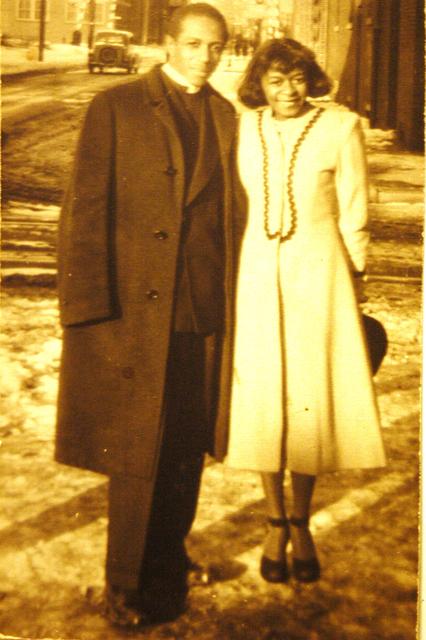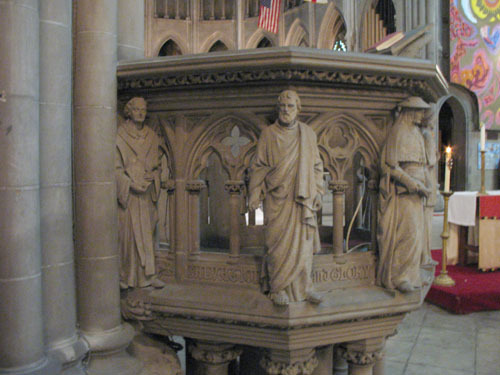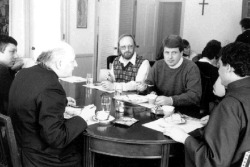The Three Movements of the Spiritual Life: Part One - From Loneliness to Solitude
Reflections based on the work of Henri Nouwen in Reaching Out
The Three Movements of the Spiritual Life
Part Two: From Hostility to Hospitality
Part Three: From Illusion to Prayer
In our loneliness we rage. Loneliness is a very self-absorbed, self-centered condition – one that all human beings know. In our loneliness we are resentful, angry, torn apart, in despair. And from the places of fear and confusion – we use one another in hurtful and cruel ways. Often we are unaware of what we have done (“Father forgive them for they know not what they do.”)
In our solitude we engage life from “A quite inner center” (Nouwen)
Kenneth Leech makes the same point in Soul Friend,
“Prayer must involve the unifying of the personality, the integration of mind and heart into one center.... Without self discovery there can be no further progress. ‘In order to find God whom we can only find in and through the depths of our own soul, we must first find ourselves.’ Without self-knowledge our love remains superficial.”
-------------
I am going to tell you about Father Paul Washington
I’ll begin by having his wife tell you --
 When Christine met Paul Washington in 1946, she was a teenage church pianist and he was an Episcopal seminarian.
When Christine met Paul Washington in 1946, she was a teenage church pianist and he was an Episcopal seminarian.
It wasn't love at first sight. She described it this way--
"I think it was respect and awe at first sight,"
"When you first met him, you were immediately impressed with his presence."
Henri Nouwen wrote …the solitude that really counts is the solitude of heart; it is an inner quality or attitude that does not depend on physical isolation…
That’s what I saw in Fr. Paul—a “solitude of the heart.” I along with many others was “immediately impressed with his presence.” He appeared to be a person who knew who he was; who had, as much as one can, come to terms with an identity as a black man and an American. He was a priest and prophet.
With Fr. Washington’s leadership the Church of the Advocate became a center for the struggles for liberation and civil rights. There was an early relationship with CORE (the Congress of Racial Equality) and the church was the site of events such as the National Conference of Black Power (1968), the Black Panther Conference (1970) and the first ordination of women in the Episcopal Church (1974). He was a chaplain at Eastern State Penitentiary, served on the city’s Human Relations Commission and later on the MOVE Commission[i].
In Two Locations
When I think of him in more personal terms I have him in two locations—one is in the small upstairs room above the parish office and the other was in the pulpit.
In that small room he would smoke his pipe, read, write, and meet with people.
There was the time when he gathered the entire summer day camp staff up there. We crowded in, excited, black and white together; energized about our work with the children teaching them from some of the same materials being used that summer in the Mississippi Summer Freedom Schools; and looking forward to the times when some of us would go off to demonstrate with CORE for jobs and the enforcement of public accommodation laws in Philadelphia. It was all very heady stuff for us high school and college kids.
All I remember from what Fr. Washington said that day was this,
“By your presence you influence these children. By the expression on your face and the tone of your voice you shape how they feel about themselves. Everything you do, every word and every look, is experienced by them. I want you to be aware of that.”
 From the large cathedral-like pulpit he stood above the congregation and preached of compassion and justice. He annoyed the more conservative doctors and teachers who would tell him how much his words disturbed their peace. And he bothered many of us because he would preach for 30 or 40 minutes if he felt called to do that.
From the large cathedral-like pulpit he stood above the congregation and preached of compassion and justice. He annoyed the more conservative doctors and teachers who would tell him how much his words disturbed their peace. And he bothered many of us because he would preach for 30 or 40 minutes if he felt called to do that.
I can’t recall anything he said from that pulpit but I do remember something he did. He was a few minutes into the sermon and he saw a young man grab the purse of a member and run for the door. Paul was out of the pulpit in a flash, in Eucharistic vestments, chasing the man onto Susquehanna Avenue. Paul recalls yelling, “You better drop it, kid, because I’m going to catch you.” He returned to the church with purse in hand and continued the sermon.[ii]
It seems more important than ever to stress that solitude is one of the human capacities that can exist, be maintained and developed in the center of a big city, in the middle of a large crowd and in the context of a very active and productive life. –Nouwen
See the gospel reading[iii] -
Great crowds came to him, bringing with them the lame, the maimed, the blind, the mute, and many others
Then Jesus called his disciples to him and said, ‘I have compassion for the crowd, because they have been with me now for three days and have nothing to eat; and I do not want to send them away hungry, for they might faint on the way.’ The disciples said to him, ‘Where are we to get enough bread in the desert to feed so great a crowd?’ Jesus asked them, ‘How many loaves have you?’ They said, ‘Seven, and a few small fish.’ From - Matthew 15:29–39
Again -
It seems more important than ever to stress that solitude is one of the human capacities that can exist, be maintained and developed in the center of a big city, in the middle of a large crowd and in the context of a very active and productive life. A man or woman who has developed this solitude of heart is no longer pulled apart by the most divergent stimuli of the surrounding world but is able to perceive and understand this world from a quiet inner center. - Nouwen
Fr. Dave Gracie retells a story[iv] about Paul Washington that he heard from Tom Cronin, a Philadelphia labor union leader. He and Paul where in a demonstration for the homeless that lead to their arrest.
After sitting down on the sidewalk around City Hall they were arrested for disorderly conduct and placed in a police wagon. I remember growing up in that city when we still called them “Paddy Wagons.”[v] They were to be transported to police headquarters to be booked.
Cronin said, “It was a very hot day, and the first thing we noticed was that the ventilator on top of the wagon was not working. They kept piling people in until we were simply jammed up against each other. Cronin goes on to describe how they tried to get the police officers attention by pounding on the side of the van and gesturing. The police response was to laugh at them. This went on for half an hour and those in the van felt panic coming on. “We worried most about one of our number who was ill—a person with AIDS. Father Washington looked frail, too; he was obviously struggling to breath.”
When they started moving the driver would hit the breaks at each stop in a way that banged people up against each other. He goes on, “We knew our destination and understood the arrest process, so when we arrived we expected to be let out immediately. That was not to be. It was another fifteen minutes in the van (about an hour, all told) before anyone opened the back doors. When they did, our friend with AIDS, who was jammed up against those doors, simply dropped out. A policeman stuck his head in the opening and said: ‘We understand Father Paul Washington is in there. He can come out.’ ‘Not until everybody comes out,’ said Paul. Then we were all released.”
From a place of solitude Fr. Paul was able to bear his own suffering and express hospitality through solidarity with his companions.
Parish Oversight and Solitude
Father Paul describes himself as going through a time when he “was deeply troubled.” He connected it with the decrease in attendance at the Advocate, a decrease he attributed to his advocating racial unity among black people and his involvement with people and movements some in the parish were uncomfortable about.
From the description he offers I think he was struggling with these poles of loneliness and solitude. He had to think and pray things through. He had to find his own comfort.
 Any authentic priesthood must derive from an inner core of silence, a life hid with Christ in God ...Only those who are at home with silence and darkness will be able to survive in, and minister to, the perplexity and confusion of the modern world. Kenneth Leech, during the 1988 retreat of the Order of the Ascension.
Any authentic priesthood must derive from an inner core of silence, a life hid with Christ in God ...Only those who are at home with silence and darkness will be able to survive in, and minister to, the perplexity and confusion of the modern world. Kenneth Leech, during the 1988 retreat of the Order of the Ascension.
Every priest, in fact every Christian, engages the world from whatever capacity for inner silence they have come to in life. We all have some capacity. I think Paul had more than most. “Our ability to be reflective depends on nurturing the inner life, on creating internal stillness and thereby a capacity to listen.”[vi]
In this case he seems to have found a place to stand in two ways; both connected with the fact that he was touching the lives of people—“often angry, indignant, hurting people.” He came to see that what he was doing was the church’s ministry—“good tidings to the poor, to bind up the brokenhearted, to proclaim liberty to the captives, the opening of prison to those who are bound.” And he saw the difference between a focus on the “congregation” and a focus on the parish. When asked “How big is your congregation?” he responded, “Well, only about a hundred congregate at the Advocate at 11:00 on Sundays, but during the week we have a congregation of about 1,500.”
The oversight ministry of a parish church has the priest taking into account three interrelated elements: the congregation, those vicariously connected, and the property.[vii] The congregation and the building are a stable and relentless demand system. Clergy have been known to become resentful toward one or both of them. I can see that temptation in Fr. Washington’s work. But he never quite gives way to it; not in the full-blown manner I’ve seen in others. Paul keeps dealing with the congregation and its lay leadership in a respectful and compassionate fashion. And even though the massive buildings of the Advocate were a concern from early in his 25 years there, he learns how to use the space to good purpose and finally as he nears retirement he faces into the need for a massive fund raising effort to deal with the property.

There is no right way for a rector to balance the three elements. The needs we face will mix with the opportunities available; a formula that will change over the years. Each priest will come at it somewhat differently according to their own solitude.
Dealing with these three elements in a productive way involves a mix of virtue and emotional intelligence. Virtue in the sense that patience and courage were called for; emotional intelligence in his self-awareness, ability to manage his moods and emotions, his empathy for others, and his ability to build relationships and bring people along in a difficult journey.
A task for the parish priest is to accept responsibility for his or her inner life and for developing that capacity.
The Parish Church
Parishes exist in the space between loneliness and solitude. Some are fragile communities of loneliness. Others are stable communities grounded in solitude. Many drift between the poles with limited awareness of their condition, no vision about what’s possible, and lacking in the skills and knowledge needed to shape a new and better future.
Parishes of loneliness have an investment in their dependence and sentimental orientation. They seek immediate and short-term gratification at the expense of long term and wise stewardship. For them the parish exists to save us from our loneliness; “togetherness” is the solution to our confusion and our emptiness.
Parishes of solitude have an ability to listen to one another even when what is said brings uncomfortable feelings; to be still and silent both in worship and in meetings; and to allow space and time for people of differing temperaments.
To live a spiritual life we must first find the courage to enter into the desert of our loneliness and to change it by gentle and persistent efforts into a garden of solitude. - Nouwen
Parishes of solitude have leadership that advances and protects space for silence, stillness and listening. They nurture the baptismal identity and life -- "An inquiring and discerning heart, the courage to will and to persevere, a spirit to know and to love you, and the gift of joy and wonder in all your works" – by the climate established, the guidance offered, and programs to equip members for Christian proficiency.
I think that what eventually emerged at the Church of the Advocate was a community of solitude that offered hospitality to, and solidarity with, marginalized and oppressed people, and was grounded in deep prayer and reality.
When Nouwen writes about the movement from illusion to prayer (which causes me to think of a movement from illusion to “ultimate reality” which is prayer as relationship, prayer in the company of the Blessed Trinity, the whole company of heaven and the communion of saints) he says, “To the degree that our prayer has become the prayer of our heart we will love more and suffer more, we will see more light and more darkness, more grace and more sin, more of God and more of humanity.”
Along the way Fr. Washington saw many members of the parish leave, unable to be part of what was emerging. In the world of hypothetical options he might have chosen to shape the parish as a community of renewal and support for those teachers and attorneys and others many of whom were relatively well off. I’m sure that parish would still have served many who struggled to survive. And in one sense such a parish would have its own integrity. Nothing wrong with that. Except for one thing; in his solitude Fr. Paul came to believe that God wanted something else.
Two things to consider
How can each of us “find the courage to enter into the desert of our loneliness and to change it by gentle and persistent efforts into a garden of solitude?”
and
How can this parish shape its life—its ways of being and doing—so that people are invited into and support in, that journey?
rag+
A handout on the movement from loneliness to solitude
[i] The Commission was established by Mayor Wilson Goode after a confrontation between the police and MOVE, a Black liberation group. The Commission’s report condemned the city government’s actions—“Dropping a bomb on an occupied row house was unconscionable.”
[ii] This differs slightly from Paul Washington’s own recollection in his book. It’s what I was told later that week. It embedded itself in my memory so clearly that as I wrote this it took me some time to realize that it was something I was told and that I hadn’t been there at the time. Even now as I write these words I’m still not sure that I wasn’t standing there when he returned with that purse feeling stunned and speechless.
[iii] Wednesday of 2 Advent
[iv] David Gracie in the introduction to Other Sheep I Have: The Autobiography of Father Paul M. Washington, Temple University Press, 1994.
[v] Paddy Wagons obviously have to do with a usually derogatory term for the Irish. Some say it comes from there being so many Irish on the city police forces through much of the 20th Century, others suggest it was related to the high crime level among Irish immigrants, and still others say it was from “P.D. Wagon” which was turned into “paddy wagon.”
[vi] “Reflection—Inner Stillness and Silence Allowing Deep Listening” Chapter 4, In Your Holy Spirit: Shaping the Parish Through Spiritual Practice, Gallagher, Ascension Press, 2011
[vii] See an earlier posting from October 30 The Parish Church: worship, building up the living, and remembering the dead